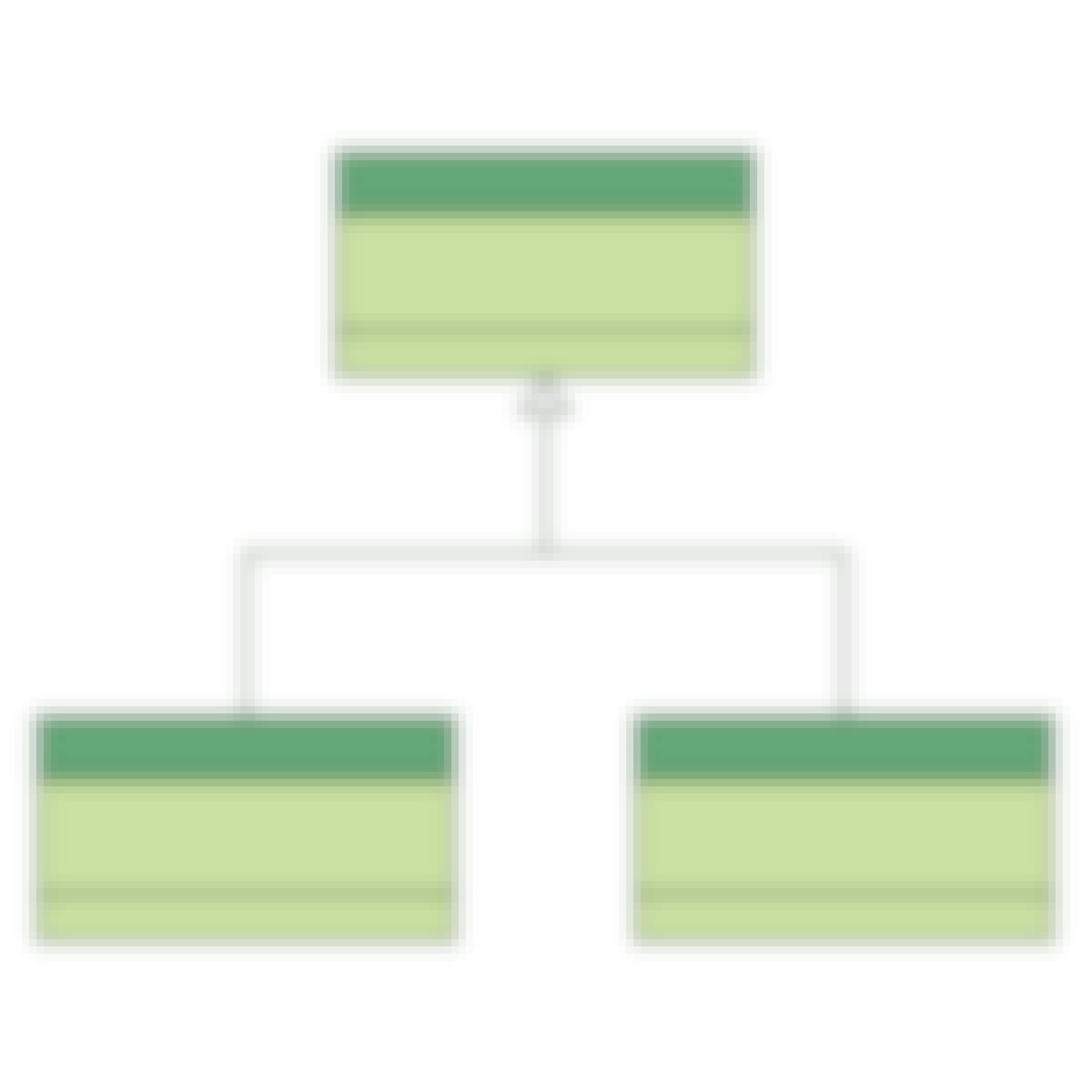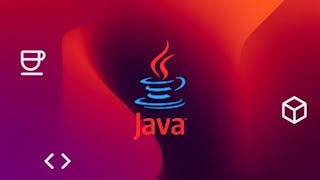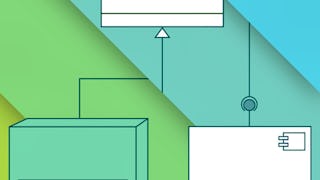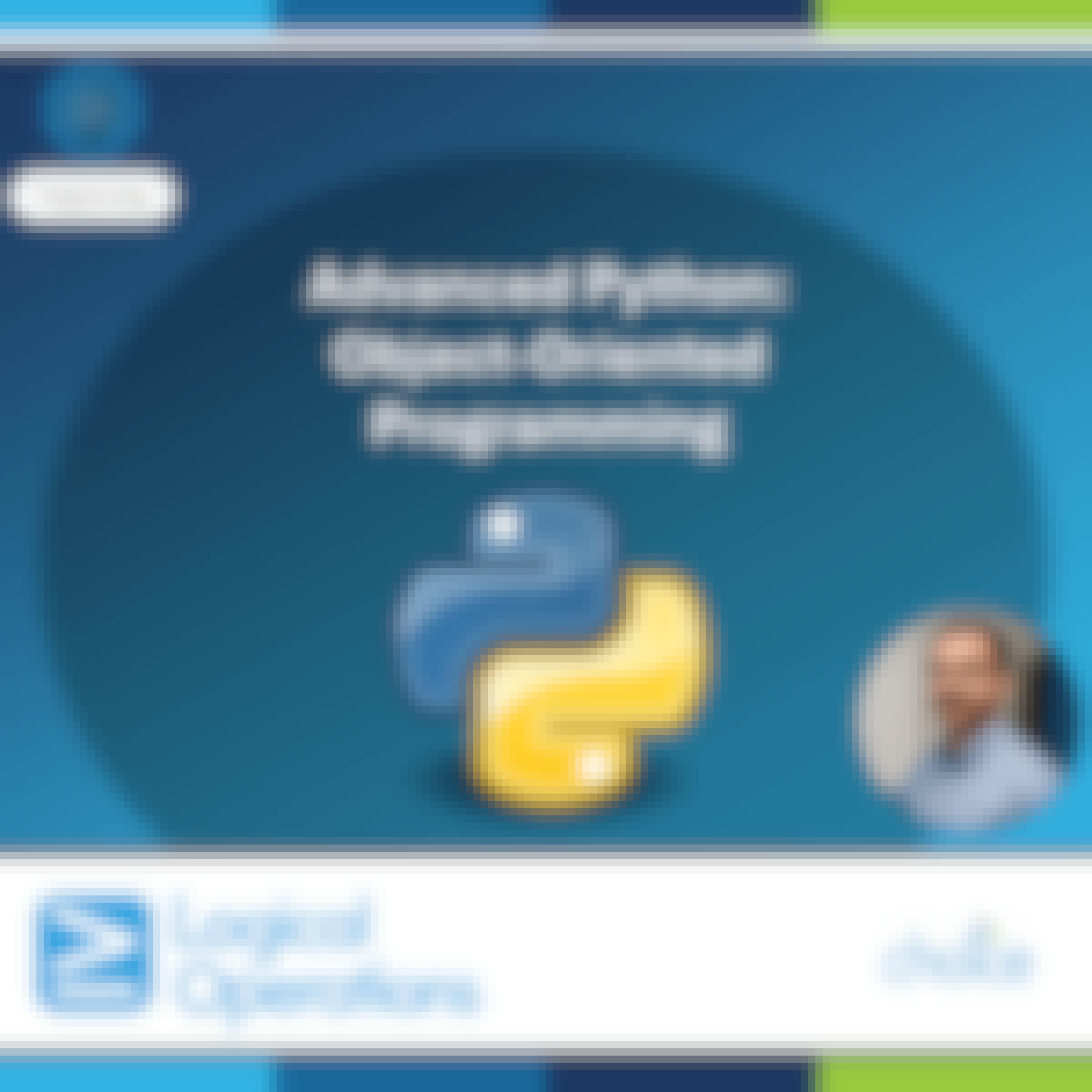- Browse
- Object Oriented Design
Results for "object-oriented design"
 Status: Free TrialFree TrialU
Status: Free TrialFree TrialUUniversity of Alberta
Skills you'll gain: Object Oriented Design, Unified Modeling Language, Software Design, Software Design Patterns, Object Oriented Programming (OOP), Java, Maintainability, Application Design
4.7·Rating, 4.7 out of 5 stars2.4K reviewsIntermediate · Course · 1 - 4 Weeks
 Status: Free TrialFree TrialU
Status: Free TrialFree TrialUUniversity of London
Skills you'll gain: Pseudocode, C++ (Programming Language), Object Oriented Programming (OOP), C and C++, File I/O, Object Oriented Design, Integrated Development Environments, Computer Programming, Development Environment, Programming Principles, Debugging, Data Structures, Program Development, Algorithms, Interactive Design, Model Evaluation, Software Engineering, Test Data, Data Validation, Command-Line Interface
Build toward a degree
4.7·Rating, 4.7 out of 5 stars248 reviewsIntermediate · Specialization · 1 - 3 Months
 Status: NewNewStatus: Free TrialFree Trial
Status: NewNewStatus: Free TrialFree TrialSkills you'll gain: Object Oriented Design, Object Oriented Programming (OOP), Unit Testing, Java, Test Automation, Software Development, Development Testing, Application Design, Software Testing, Application Development, System Design and Implementation, Data Validation, User Interface (UI), Debugging, Data Integrity, Business Logic
Beginner · Course · 1 - 4 Weeks
 Status: Free TrialFree TrialU
Status: Free TrialFree TrialUUniversity of California San Diego
Skills you'll gain: Unit Testing, Growth Mindedness, Data Structures, Graph Theory, Event-Driven Programming, Social Network Analysis, Interactive Data Visualization, Java, Java Programming, Network Analysis, Object Oriented Programming (OOP), Technical Communication, User Interface (UI), JUnit, Object Oriented Design, Computer Programming, Adaptability, Performance Tuning, Algorithms, Problem Solving
4.7·Rating, 4.7 out of 5 stars7.2K reviewsIntermediate · Specialization · 3 - 6 Months
 Status: Free TrialFree TrialU
Status: Free TrialFree TrialUUniversity of Alberta
Skills you'll gain: Software Architecture, Model View Controller, Unified Modeling Language, Object Oriented Design, Service Oriented Architecture, API Design, Web Services, Software Design Patterns, Software Design, Simple Object Access Protocol (SOAP), Microservices, Restful API, Code Review, Product Family Engineering, Software Systems, Object Oriented Programming (OOP), Software Development, Java, Software Documentation, Maintainability
4.6·Rating, 4.6 out of 5 stars4K reviewsBeginner · Specialization · 3 - 6 Months
 Status: Free TrialFree TrialS
Status: Free TrialFree TrialSSkillUp
Skills you'll gain: Systems Design, Business Process Modeling, Data Flow Diagrams (DFDs), Systems Analysis, Data Modeling, Digital Transformation, Business Process, Risk Management, Workflow Management, Systems Architecture, Business Analysis, Solution Design, Enterprise Resource Planning, Information Technology, Process Flow Diagrams, Prototyping, Computer Science, Agile Methodology, Product Lifecycle Management, Business Communication
4.7·Rating, 4.7 out of 5 stars20 reviewsIntermediate · Course · 1 - 4 Weeks
What brings you to Coursera today?
 Status: Free TrialFree TrialL
Status: Free TrialFree TrialLLearnQuest
Skills you'll gain: Unified Modeling Language, Object Oriented Programming (OOP), Object Oriented Design, Test Driven Development (TDD), Software Design Patterns, Software Design, Programming Principles, Computer Programming, Java Programming, Software Development Methodologies, Distributed Computing
4.5·Rating, 4.5 out of 5 stars148 reviewsBeginner · Course · 1 - 4 Weeks
 Status: Free TrialFree TrialU
Status: Free TrialFree TrialUUniversity of Alberta
Skills you'll gain: Model View Controller, Software Design Patterns, Software Design, Unified Modeling Language, Object Oriented Design, Code Review, Software Architecture, Programming Principles, Maintainability, Java, Application Design
4.7·Rating, 4.7 out of 5 stars1.4K reviewsIntermediate · Course · 1 - 4 Weeks
 Status: NewNewB
Status: NewNewBBirla Institute of Technology & Science, Pilani
Skills you'll gain: Object Oriented Design, Software Architecture, Software Design, Software Design Patterns, Software Development Life Cycle, Software Development, Software Engineering, Maintainability, Systems Architecture, Service Oriented Architecture, Technical Design, Web Services, Model View Controller, Event-Driven Programming
Intermediate · Course · 1 - 3 Months
 Status: NewNewStatus: Free TrialFree TrialM
Status: NewNewStatus: Free TrialFree TrialMMicrosoft
Skills you'll gain: Generative AI
Beginner · Course · 1 - 3 Months
 Status: NewNewStatus: Free TrialFree TrialL
Status: NewNewStatus: Free TrialFree TrialLLogical Operations
Skills you'll gain: Object Oriented Design, Object Oriented Programming (OOP), Software Design, Application Development, Python Programming, Computer Programming, Programming Principles, Software Development, Scripting, Virtual Machines, Scripting Languages
Mixed · Course · 1 - 4 Weeks
 Status: Free TrialFree TrialU
Status: Free TrialFree TrialUUniversity of Colorado Boulder
Skills you'll gain: Object Oriented Design, JUnit, Object Oriented Programming (OOP), Unified Modeling Language, Software Design Patterns, Software Testing, Software Engineering, Java, Java Programming, Computer Programming, Application Design, User Interface and User Experience (UI/UX) Design, Unit Testing, Software Design, Software Architecture, API Design, Model View Controller, Program Development, Software Development, Databases
4.1·Rating, 4.1 out of 5 stars14 reviewsIntermediate · Specialization · 3 - 6 Months
Searches related to object-oriented design
In summary, here are 10 of our most popular object-oriented design courses
- Object-Oriented Design: University of Alberta
- Object Oriented Programming: University of London
- Analyze, Design & Implement Java CRUD with TestNG: EDUCBA
- Object Oriented Java Programming: Data Structures and Beyond: University of California San Diego
- Software Design and Architecture: University of Alberta
- IT Systems Design and Analysis : SkillUp
- Object-Oriented Programming Concepts: LearnQuest
- Design Patterns: University of Alberta
- Software Design Principles: Birla Institute of Technology & Science, Pilani
- Object Oriented Programming with C++: Microsoft
Frequently Asked Questions about Object Oriented Design
Object-oriented design (OOD) is a programming paradigm that organizes software design around objects, which are instances of classes representing real-world entities. It emphasizes modular, reusable, and versatile code structures. In OOD, software systems are built by creating classes that define the data and behaviors associated with specific objects. These objects can communicate and interact with each other through well-defined interfaces, encapsulating both data and methods together. OOD enables a more organized and efficient way to design and develop complex software applications.
To excel in Object-oriented design (OOD), there are several essential skills you should focus on learning:
Programming languages: Start by acquiring a solid understanding of programming languages that support object-oriented programming (OOP) concepts, such as Java, C++, or Python. These languages will be your main tools for implementing OOD principles.
OOP Concepts: Familiarize yourself with key OOP principles, including encapsulation, inheritance, polymorphism, and abstraction. These concepts form the foundation of OOD and enable you to design systems with modularity, reusability, and flexibility in mind.
Class and Object Design: Master the art of designing classes and objects effectively. Learn how to define class hierarchies, create relationships between classes using inheritance and composition, and design efficient object interactions.
Design Patterns: Gain knowledge about common design patterns, such as Singleton, Factory, Observer, and MVC (Model-View-Controller). Design patterns provide reusable solutions to recurring design problems and help you create highly maintainable and scalable code.
UML (Unified Modeling Language): Familiarize yourself with UML, a visual modeling language widely used for designing and documenting OOD systems. Understand how to create UML diagrams like class diagrams, sequence diagrams, and use case diagrams to visualize and communicate your design ideas.
SOLID Principles: Learn about the SOLID principles, which are a set of guidelines for designing maintainable and extensible software. These principles emphasize concepts like single responsibility, open-closed principle, Liskov substitution principle, interface segregation, and dependency inversion.
Testing and Debugging: Acquire knowledge about testing and debugging techniques specific to OOD. Explore unit testing frameworks, such as JUnit or NUnit, that help ensure the correctness of your code and identify and fix issues effectively.
Refactoring: Understand the importance of refactoring and how to apply it in OOD. Refactoring involves restructuring existing code to improve its design, readability, and maintainability without changing its external behavior. It is crucial for evolving a codebase over time.
- Continuous Learning: Stay updated with the latest trends and advancements in OOD. Read relevant literature, follow influential blogs and forums, participate in online communities, and engage in continuous practice to constantly refine your skills.
By acquiring these skills, you will be well-equipped to design robust, scalable, and maintainable software systems using Object-oriented design principles.
Jobs that require object-oriented design skills include software developer, software engineer, web developer, mobile application developer, computer programmer, system architect, software architect, database administrator, quality assurance engineer, game developer, and many more. OOD is a fundamental concept in software development, and having strong skills in this area opens up numerous career opportunities in the tech industry.
People who are logical thinkers, detail-oriented, and have a strong problem-solving ability are best suited for studying Object-oriented design (OOD). Additionally, individuals who have a strong foundation in programming concepts and are comfortable with abstract thinking will find OOD more accessible. OOD requires a systematic approach to designing software systems, so individuals who enjoy organizing and structuring information will excel in this field.
Here are some topics that are related to Object-oriented design (OOD) that you can consider studying:
Object-oriented programming (OOP): Learn the principles and concepts of OOP, including classes, objects, inheritance, polymorphism, and encapsulation.
UML (Unified Modeling Language): Understand how to use UML to model object-oriented systems, including class diagrams, object diagrams, use case diagrams, and sequence diagrams.
Design patterns: Explore commonly used design patterns like Singleton, Factory, Observer, and Strategy, and learn how they can be applied to design robust and maintainable object-oriented code.
Software architecture: Delve into the architectural patterns and practices used in object-oriented systems, such as Model-View-Controller (MVC), Model-View-ViewModel (MVVM), and Layered Architecture.
Object-oriented analysis: Discover techniques and methodologies to identify and define the requirements of an object-oriented system, including use case modeling, activity diagrams, and scenario-based analysis.
Refactoring: Learn how to improve the design and maintainability of existing object-oriented code through refactoring techniques, such as extracting methods, moving code between classes, and eliminating code smells.
Test-driven development (TDD): Understand the concept of TDD and how it can be applied in an object-oriented context, including writing testable code, creating unit tests, and practicing test-driven design.
SOLID principles: Familiarize yourself with the SOLID principles (Single Responsibility, Open-Closed, Liskov Substitution, Interface Segregation, Dependency Inversion), which guide the development of modular and extensible object-oriented applications.
Designing for reusability: Explore strategies for designing object-oriented systems that promote code reuse, including inheritance, composition, and the use of interfaces.
- Domain-driven design (DDD): Dive into the principles and practices of DDD, which emphasizes modeling code based on the business domain, and learn how to apply object-oriented design concepts within a DDD context.
These topics will provide you with a solid understanding of Object-oriented design (OOD) and equip you with the necessary skills to develop robust and maintainable object-oriented applications.
Online Object-oriented design (OOD) courses offer a convenient and flexible way to enhance your knowledge or learn new Object-oriented design (OOD) is a programming paradigm that organizes software design around objects, which are instances of classes representing real-world entities. It emphasizes modular, reusable, and versatile code structures. In OOD, software systems are built by creating classes that define the data and behaviors associated with specific objects. These objects can communicate and interact with each other through well-defined interfaces, encapsulating both data and methods together. OOD enables a more organized and efficient way to design and develop complex software applications. skills. Choose from a wide range of Object-oriented design (OOD) courses offered by top universities and industry leaders tailored to various skill levels.
When looking to enhance your workforce's skills in Object-oriented design (OOD) , it's crucial to select a course that aligns with their current abilities and learning objectives. Our Skills Dashboard is an invaluable tool for identifying skill gaps and choosing the most appropriate course for effective upskilling. For a comprehensive understanding of how our courses can benefit your employees, explore the enterprise solutions we offer. Discover more about our tailored programs at Coursera for Business here.










